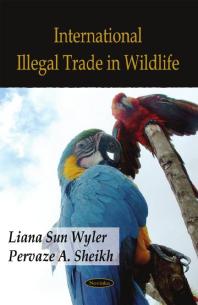(Ebook) International Illegal Trade in Wildlife by Liana Sun Wyler; Pervaze A. Sheikh ISBN 9781619429772, 1619429772
Global trade in illegal wildlife is a growing illicit economy, estimated to be worth at least $5 billion and potentially in excess of $20 billion annually. Some of the most lucrative illicit wildlife commodities include tiger parts, caviar, elephant ivory, rhino horn, and exotic birds and reptiles. Demand for illegally obtained wildlife is ubiquitous, and some suspect that illicit demand is growing. International wildlife smuggling may be of interest to Congress as it presents several potential environmental and national security threats to the United States. Threats to the environment include the potential loss of biodiversity, introduction of invasive species into U.S. ecosystems, and transmission of disease through illegal wildlife trade, including through illegal bushmeat trade. National security threats include links between wildlife trafficking and organized crime and drug trafficking. Some terrorist groups may also be seeking to finance their activities through illegal wildlife trade, according to some experts. Wildlife source and transit countries may be especially prone to exploitation if known to have weak state capacity, poor law enforcement, corrupt governments, and porous borders. The U.S. government addresses illegal wildlife trade through several national and international venues. Congress has passed numerous laws that regulate and restrict certain types of wildlife imports and exports, including the Endangered Species Act of 1973, the Lacey Act and Lacey Act Amendments of 1981, and several species-specific conservation laws. These laws and others establish authorities and guidelines for wildlife trade inspection at ports of entry, and wildlife crime law enforcement and prosecution. Internationally, the United States is party to several wildlife conservation treaties, including the U.N. Convention on International Trade in Endangered Species of Wild Fauna and Flora (CITES), which serves as the primary vehicle for regulating wildlife trade. Foreign training and assistance programs to combat illegal wildlife trade are also conducted by some federal agencies, including the U.S. Department of State, which leads an international initiative against wildlife trafficking. The role of Congress in evaluating U.S. policy to combat wildlife trafficking is broad. Potential issues for Congress include (1) determining funding levels for U.S. wildlife trade inspection and investigation; (2) evaluating the effectiveness of U.S. foreign aid to combat wildlife trafficking; (3) developing ways to encourage privatesector involvement in regulating the wildlife trade; (4) using trade sanctions to penalize foreign countries with weak enforcement of wildlife laws; (5) incorporating wildlife trade provisions into free trade agreements; and (6) addressing the domestic and international demand for illegal wildlife through public awareness campaigns and non-governmental organization partnerships. This book focuses on the international trade in terrestrial fauna, largely excluding trade in illegal plants, including timber, and fish.
*Free conversion of into popular formats such as PDF, DOCX, DOC, AZW, EPUB, and MOBI after payment.


